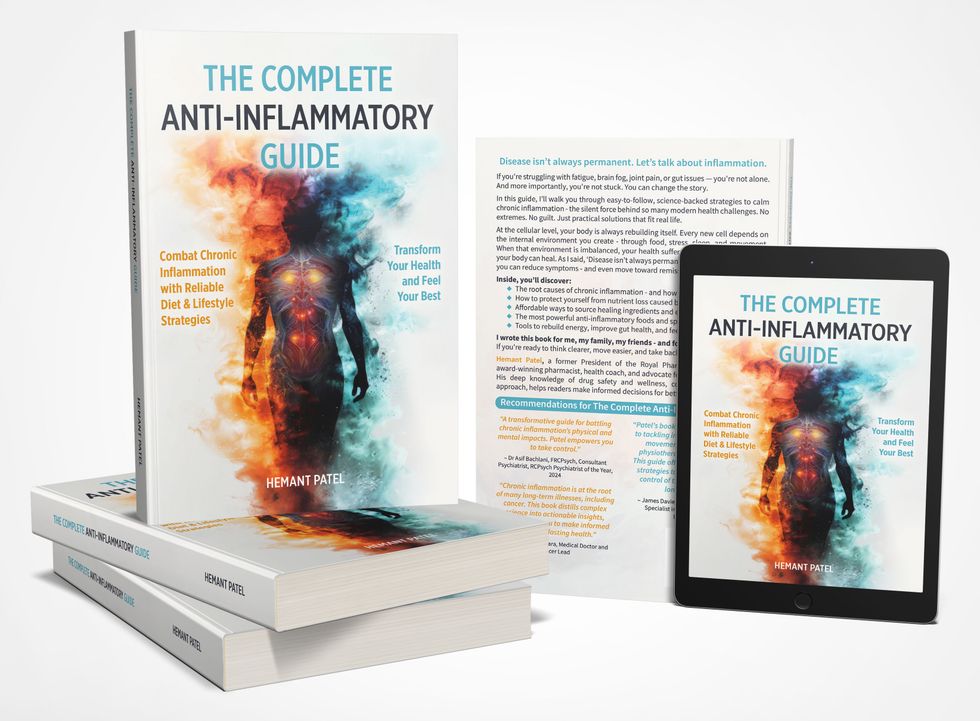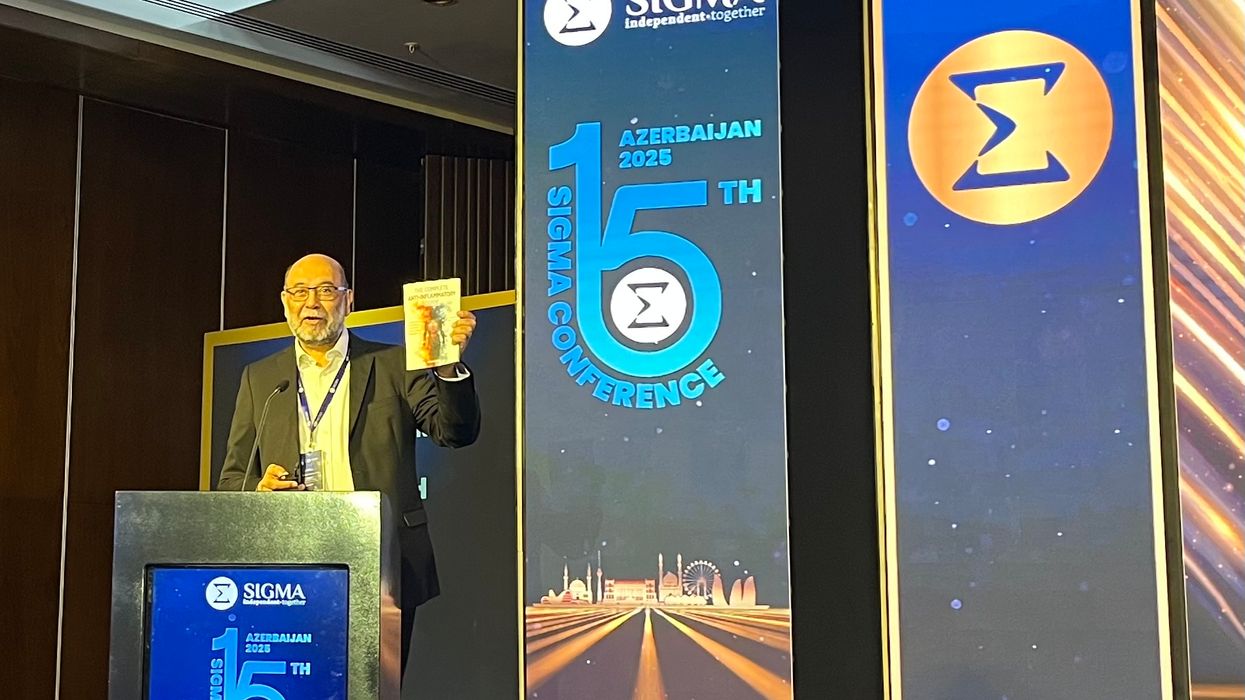WHEN Hemant Patel was struck down by Covid, he became determined to understand why the virus had such a devastating effect on people who appeared healthy.
That quest led to The Complete Anti-Inflammatory Guide, a book exploring the role of inflammation in chronic illness.
“I was gasping for breath and counting the days I might have left when I was infected with Covid,” said Patel.
“I was watching TV and saw two stories – one about a 70-year-old man returning home from hospital, and the other about a 40-year-old marathon runner who had died. My brain could not comprehend that. I would have expected different outcomes – as I’m sure most people would.”
Patel was the secretary of North East London’s Local Pharmaceutical Committee for 26 years and also served four terms as president of the then Royal Pharmaceutical Society of Great Britain (RPSGB).
He worked to improve the health of patients, helping contractors develop new clinical services, including smoking cessation, sexual health, mental health support and the use of electrocardiogram devices within community pharmacy.
He used his vast knowledge and experience to look into the impact of Covid and discovered the impact of inflammation on a person’s health and well-being.
Chronic inflammation is linked to more than 50 per cent of all deaths worldwide and one in five cancers.
“I started investigating and I realised in the West, particularly, we are confused between physical fitness and resilience,” he said.
“What I learned from my extensive research is that you can be physically fit but immunologically not resilient. Then I said, ‘what do we need to do to become resilient? And the outcome is the book.”
Chronic inflammation contributes to high cholesterol, high blood pressure and diabetes, which are all linked to coronary heart disease (CHD).
While heart disease is the UK’s single biggest killer and it can affect anyone, south Asians are approximately 50 per cent more likely to die prematurely from CHD than the general population
“With the south Asian culture, we need to break habits, but also we need to reinforce some good ones,” said Patel.
“Spices are very good, particularly turmeric, which should be combined with black pepper because it contains a substance called piperine that is one of the most powerful anti-inflammatories you can take. Things like ginger and garlic are really good.
“But things like potatoes and meat need to be avoided and replaced with more green vegetables – the more different colours of food, the better.”
The book received an overwhelmingly positive response from members of the pharmacy sector when it was launched at the Sigma Conference in Baku, Azerbaijan last Monday (12).
Patel said the book will be a useful resource for first-line healthcare providers such as community pharmacists and GPs advising their patients on healthier lives.
“The secretary of state (Wes Streeting) has said the government will be investing in prevention rather than treatment, because, at present, more and more hospitals are being required
Pharmacists and GPs can be a force within the community to help patients change their lifestyles.”
Patel’s determination to write the book led him to qualify as a certified health coach after completing a course in integrative nutrition and functional medicine.
“The common link for vast number of long-term conditions is inflammation,” he said.
“If you look at the prevalence of conditions such as obesity, diabetes, high blood pressure and mental illness – they have all increased since the Second World War, due to changes in our environment, food, water, the air we breathe, and the products we spray on ourselves. All of this leads to toxicity and a slow, prolonged immunological response.

“If you look at carrots, for example, it is estimated they contain only 40 per cent of the nutrients they had 60 years ago, because the soil has been depleted. That affects the food, and the food, in turn, affects our bodies. When people say, ‘eat healthily’, no one actually knows what is going on inside their body.”
There are 12 steps in the book that can be used to combat chronic inflammation and regain “internal balance”.
Patel gives evidence-based advice on ways to reduce inflammation, such as going for a walk in the park, meditation, getting regular sleep, switching to organic foods, eating more vegetables, reducing meat – particularly red meat – drinking filtered water.
He describes alcohol as “poison – we use it to clean our skin when we fall down and hurt ourselves”.
Two scientifically proven ways to reverse chronic inflammation are exercise and intermittent fasting – both of which Patel has personally benefited from.
“When you fast, instead of using energy to digest food, the body switches to clearing out internal waste – it removes dead cells and recycles them. More importantly, new cells are produced during fasting through a process called autophagy.”
Autophagy is a natural process by which a cell breaks down old, damaged, unnecessary, or dysfunctional components within a cell and then repurposes those components for fuel and to build or maintain cells. It also destroys diseasecausing pathogens, like bacteria and viruses, that can harm cells and has been linked in playing a role in preventing and fighting diseases like Parkinson’s disease and Crohn’s disease.
As for exercise, Patel explains you don’t have to run a marathon to see benefits.
“When we use our muscles, the body releases a substance called myokines which is anti-inflammatory,” he said.
Patel has carried out research into ancient cultures who he believes had a more holistic approach to health.
“The book looks at areas such as Chinese and Ayurvedic culture – we have a lot to learn from them,” he said.
“It is a pity we have moved away from that approach, because they focus on the whole body. In the West, we treat each organ separately – you have a cardiologist, a rheumatologist, a kidney specialist – whereas in Ayurveda, the body is treated as a whole, and that is where inflammation comes in.
Inflammation does not affect just one area. If you have a dodgy knee, the symptoms may appear there, but inflammation is likely present elsewhere in the body too.”
Patel reveals he has seen first-hand the result diet and exercise has had on his own father’s life.
“My father and uncle were twins, but they led very different lifestyles. My father did not drink alcohol, followed a vegetarian diet, and began each day with yoga. He is 94 years old and can still touch the back of his head with his toes,” said Patel.
“My uncle, on the other hand, put on a lot of weight. He ate nastas (wholesome breakfasts) and salty foods. When you compare their health outcomes, my father is healthy and alive, while my uncle died a year ago after being seriously ill for two years.
Investing in your health does two things – it extends your life and improves its quality in later years.”
As for Patel’s own health, at 71, he feels in the best shape he has for decades after implementing the strategies he has shared in the book.
“I had long Covid and I was in a bad state,” he said.
“When I got up in the morning, it was like I had drank a bottle of whiskey the night before. I was rested, but my head wasn’t clear. By lunchtime, I was fatigued and wanting to go to sleep. I was in so much pain constantly.
“Now my head is clear. My pain has eased up a lot. I’m sleeping much better and probably a better person to be around than before because I was just so irritable. Every single day, using my dad as an inspiration, I’m going to keep going.”




